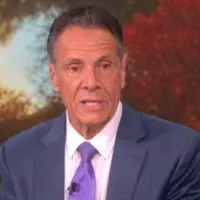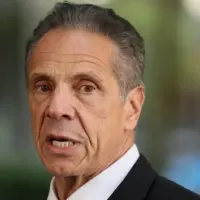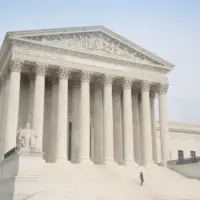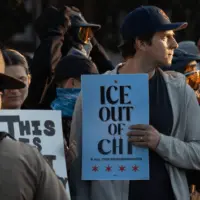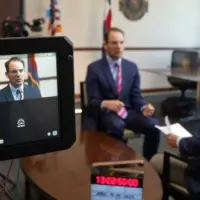
(COLORADO SPRINGS, Colo.) — Conversion therapy, or the attempt to change a patient’s sexual orientation or gender identity as a form of treatment, has been widely discredited by major American mental health and medical organizations for decades. Half the states have outlawed the practice as ineffective and harmful to minors, often on a bipartisan basis.
On Tuesday, a licensed therapist who offers “faith-informed” counseling services in Colorado will directly confront that consensus at the U.S. Supreme Court, asking the justices to strike down the laws as infringements on free speech.
“I want to be able to speak genuinely, openly, have full conversations with my clients,” said Kaley Chiles, the plaintiff in the high court case, in an interview with ABC News, “without the state kind of peering into my office in these completely private conversations.”
“If someone comes into the office and they say, I am a biological male and I have been living and presenting as a female for a while now – those are the clients who I cannot have a full conversation with,” Chiles said.
The case pits the First Amendment against a state’s regulation of medical practices to comply with an established standard of care. It also implicates the rights of parents in search of help for children struggling during puberty and the mental health of LGBTQ young people in search of greater societal acceptance.
The Colorado Minor Conversion Therapy Law, enacted in 2019, says therapists licensed by the state are not allowed to try to “change behaviors or gender expressions” or try to “eliminate or reduce” same-sex attraction. Violators face up to a $5000 fine and potential loss of license.
The law does not apply to religious groups or faith-based ministries aimed at changing a person.
Therapists are allowed to provide “acceptance, support, and understanding” around areas of sexuality and gender identity as a child develops.
“Making you feel bad about who you are, or pressuring you to be someone else, that’s not legitimate therapy,” Colorado Attorney General Phil Weiser told ABC. “The medical consensus is clear. That’s why it’s banned here in Colorado on a bipartisan basis.”
“This law allows children to be their best authentic selves, whatever it is. It doesn’t put a thumb on the scale either way,” Weiser said.
One in four American high schoolers identify as gay, lesbian, or bisexual, according to a first-of-its-kind 2023 survey conducted by the Centers for Disease Control and Prevention. Three percent of teens identify as transgender and another 2 percent report questioning their gender, the survey found.
“What happens is that people do develop, their sexuality emerges, their gender emerges. Those changes happen naturally, but it’s not because some therapist has affected that change,” said Dr. Clinton Anderson, a trained psychologist who spent more than 30 years studying mental health care for LGBTQ people at the American Psychological Association (APA).
Citing scientific, ethical, and safety concerns, the APA, American Psychiatric Association, American Academy of Pediatrics, American Medical Association and nine other mental health and medical organizations oppose efforts by a provider to change a young person’s sexual orientation or gender identity.
“If you are trying to make them change, and they’re not going to be successful,” Anderson added, “then the distress they bring into the therapy gets compounded by their concern about being a failure, particularly in these religious contexts.”
Attorneys for Chiles dispute the consensus scientific conclusions about the ineffectiveness of using talk therapy for a goal of conversion and any harm that may come from it.
Chiles won’t say directly whether she wants to practice conversion therapy or whether she has successfully used the treatment in the past to help a client eliminate unwanted feelings of same-sex attraction or reach better alignment with sex assigned at birth.
She said the law has a chilling effect that prevents her from even approaching the topics.
“The statute is broad, overarching language and it prevents me from doing what I want to do with clients,” she said. “Minors who are coming to me voluntarily of their own free will, who might have values different from the state and who have goals that the state has forbidden – they can’t come and have the same conversation with me that they could before this law.”
Erin Lee, a mother of three in Wellington, Colorado, says her daughter Chloe was unable to find a counselor willing to help her resolve a struggle over gender identity during puberty because of Colorado’s law.
“She had already made up this, ‘I’m gonna go by Toby now’ and ‘I’m ready to cut my hair’ and ‘I don’t wanna wear girls’ clothes anymore’,” Erin said of her then 12-year-old daughter in an interview at the family home.
“We knew she was not a boy who was trapped in the wrong body,” she said. “We thought, we have to talk to a professional so we know what to say, because if in fact she’s just experiencing normal distress over her sex, we don’t wanna push her further into this trans identity.”
Lee claims a counselor who worked briefly with Chloe “was dodging the issue entirely” because of the law, which in turn pushed Chloe deeper into depression and contemplation of suicide.
“The law as I very clearly – it’s very clearly written and, as I interpret it, it prevents counselors from being able to help kids through their gender confusion. They can only help them into it,” Erin said. She founded a grassroots advocacy group, Protect Kids Colorado, to oppose the restrictions on therapists.
Chloe, now 16, said she has become more comfortable as a cisgender girl despite what her parents have lamented was a lack of resources to help her. “I felt a lot of shame and despair that seemed absolutely inexplicable,” she recently told a gathering of parent advocates. “I’m not a boy, and I was just really really confused.”
Still, many Americans who have experienced conversion therapy as minors – and therapists who once pushed the practice — now say it was dangerously destructive and rightfully banned.
An estimated 700,000 LGBT adults in the US have received conversion therapy –half were subjected to the practice as adolescents, according to the Williams Institute at UCLA School of Law.
“The trauma of conversion therapy can last a lifetime,” said Matthew Shurka, 37, a self-described “survivor” of four conversion therapists over five years.
After sharing feelings of sexual attraction to other boys with his parents when he was 16, Shurka’s father sought out help from licensed therapists. Some said they could cure Matthew.
“They said that I was an easy case, that I should start to see my heterosexuality come back within six weeks,” he told ABC News in an interview. “My father made this situation life or death, and he really felt that he was saving my life.”
One therapist told Shurka that a key part of treatment would be no contact with female family members — his two sisters and his mother — which lasted 3 years. He was also coached as a teenager to use Viagra to help intimacy with women.
“Maybe I was able to perform on that specific evening, but the harm that I was doing to my mental self was starting – at times, it felt irreversible,” Shurka said. “That is when I knew that suicide may be an option for me, because I knew I wasn’t changing.”
In 2018, Shurka testified in Colorado about his experience, urging lawmakers to adopt the conversion therapy ban, which they later did.
“Any therapist can share their opinion on anything. That is their freedom of speech,” he said. “But when it comes to a course of treatment, that’s professional speech. I was given a treatment to cure my homosexuality that had no basis in any scientific finding.”
The Tenth Circuit U.S. Court of Appeals upheld Colorado’s law as a legitimate regulation of “professional conduct,” which incidentally restricted speech but was not viewpoint discrimination.
The Supreme Court will decide whether to affirm that conclusion and, in the process, wade into an impassioned national debate over how to best help developing teens.
“We know that young kids right now are hurting,” said Attorney General Weiser. “One of the ways we protect young people is we let them have autonomy about who they are.”
A decision in the case — Chiles v Salazar — is expected in spring 2026.
Copyright © 2025, ABC Audio. All rights reserved.






